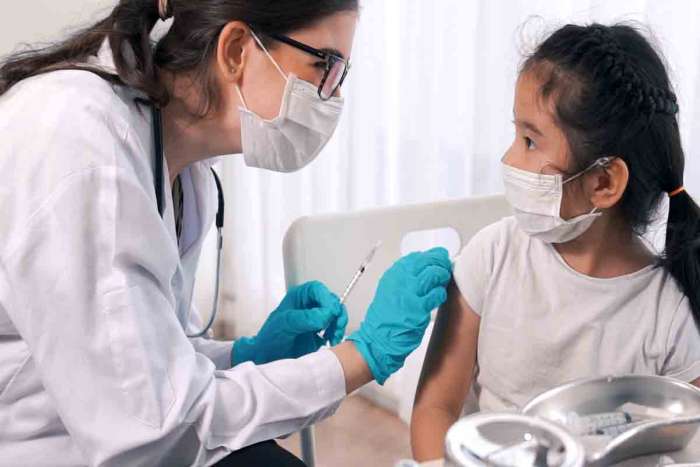As much as we had hoped the COVID-19 pandemic would be a distant memory almost two years in, it is unfortunately still rearing its ugly head around the country and the world. With each new variant that surfaces, the CDC, school systems, communities, cities, and states grapple with how to handle new caseloads, symptoms, vaccine requirements, and booster shots.
While at the time of print, a booster shot is not a requirement to be considered fully vaccinated, we have to ask ourselves if that is a reality in the future; and if so, how soon in the future?
More and more cities and towns are requiring proof of vaccination to enter gyms, restaurants, and performance venues. In addition, many vaccine mandates have begun to include children ages five and up in response to the CDC approving the use of the Pfizer COVID-19 vaccine for children ages 5-11 in November of 2021.
If you are a parent that has questions about vaccines, boosters, and all things COVID-related, we are here to help! This article breaks down various aspects of COVID-19 vaccines and boosters to provide you with essential information from trusted sources.
More: 5 Activities for Kids During the COVID Pandemic
What Does Fully Vaccinated Mean?
The first step in understanding vaccines and boosters is knowing what it means to be fully vaccinated.
40 Educational Shows for Kids You Can Stream Now
Searching for educational video programs for your kids to watch during COVID-19 school closures? With so many options available on various streaming services, it can be overwhelming to do the research, even if you have extra time on your hands. Read More
According to the Centers for Disease Control and Prevention, being fully vaccinated means that you are two weeks past your second dose of an approved vaccine. In the United States, the only three approved vaccines for adults are Johnson & Johnson, Moderna, and Pfizer. The Johnsons & Johnson vaccine is a single-dose vaccine; therefore, you only need to receive one dose of the vaccine to be considered fully vaccinated.
Moderna and Johnson & Johnson have, as of print, have only been approved for those 18-years-old and above. Pfizer-BioNTech has two different vaccines for various age groups. The adult vaccine is for anyone 12 years old and above, and the pediatric vaccine is for ages 5-11. At this time, clinical trials are ongoing for children under 5.
The American Academy of Pediatrics recommends that all children and adolescents five years of age and up receive the COVID-19 vaccine and endorse the Pfizer vaccine, which has been approved for emergency use in children.

What is Emergency Use Authorization vs. Full Approval?
Since the onset of COVID and the introduction of COVID-19 vaccines, many people have questioned vaccine safety and if a vaccine indeed prevents COVID or mitigates severe illness. Data overwhelmingly supports that getting a vaccine significantly lowers your chances of becoming infected with COVID-19 and preventing hospitalization should you catch the virus.
As of Monday, August 23rd, 2021, the Food and Drug Administration (FDA) granted full approval to the Pfizer-BioNTech vaccine for adults (16+), making it the first vaccine to receive that status. However, the Moderna, Johnson & Johnson, and Pfizer pediatric vaccines are still under the blanket of emergency use authorization.
Emergency use authorization does not imply that the vaccines are not safe; instead, it means that more information and data are still needed to determine its full effectiveness, side effects, and risks.
Per the Mayo Clinic:
“Emergency use authorization requires manufacturers to follow at least half of clinical trial participants for at least two months post vaccination, which is the period when most side effects occur. Full approval requires trial participants to be followed for at least six months, and it requires a higher level of oversight and inspections and a more in-depth review of data about effectiveness and manufacturing processes.”
Going through the process of Emergency Use Authorization is standard procedure for a vaccine. To see a list of other current EUAs under the FDA, click here.
What Is a COVID-19 Booster?
A COVID-19 booster is an additional vaccine administered to fully vaccinated individuals. Some vaccines lose effectiveness over time, and therefore booster shots are needed. Many of the vaccines we received in childhood required boosters. COVID-19 boosters have been authorized by both the CDC and the FDA for many groups of people.
The CDC recommends a COVID-19 booster if you are:
- 18 or older and received the Janssen/Johnson & Johnson vaccine at least two months ago.
- 18 or older and received both required doses of the Moderna vaccine at least six months ago
- 16 or older and received both required doses of the Pfizer-BioNTech vaccine at least six months ago. The Pfizer-BioNTech vaccine is the only vaccine and booster authorized for individuals ages 16 and 17.
Individuals who have a medical condition associated with immunosuppression are eligible to receive an additional vaccine dose.
You may have heard the term third dose being tossed around. A third or additional dose is different from a booster and is recommended for immunosuppressed patients. Unlike a vaccine booster which is given several months later once the effects of the original vaccine may start to lessen, an additional or third dose can be given as soon as 28 days after the second shot.
What Age Can Kids Get the Booster?
Children under 16 are not being recommended for a COVID-19 booster shot at this time, but as quickly as coronavirus changed from the Delta variant to Omicron, those guidelines could change too. The CDC is the best place to look to stay current on booster guidelines and recommendations.
Anthony Fauci, MD, director of the National Institute of Allergy and Infectious Diseases, told CNN that kids may not need a booster at all because young people typically have stronger immune systems, and are more likely to stay protected from their initial vaccine.
However, while kids under age 16 are currently not eligible to get the COVID-19 booster, there are other precautions for kids who are immunocompromised. According to the CDC, People aged 12+ who are moderately or severely immunocompromised should get an additional primary shot of Pfizer-BioNTech COVID-19 vaccine.
This additional primary shot is not the same as the booster, and should be given at least 28 days after a child has received their second COVID shot.
If your child is 16 years old or older, you can speak with their doctor to weigh whether or not they need a booster.
Where Can I Get a COVID-19 Booster?

COVID-19 booster shots can be administered at any vaccine location pending availability. It is recommended that you receive a booster of the same vaccine you originally received, but you can mix and match your booster should you desire. You can also receive your booster and flu vaccine at the same time.
Many parents are opting to have their children vaccinated at the primary care or pediatrician office to offer familiarity to their children; however, vaccination clinics, and pharmacies are also an option for vaccine appointments.
What Are the Side Effects of a Booster?
The side effects of a COVID booster are reported as being similar to side effects after receiving the first dose and or second dose.
The most common side effects reported are:
- Pain at the injection site
- Fatigue
- Fever
- Headache
- Muscle Pain
- Chills
One concern, although rare, has been myocarditis. Put simply, myocarditis is the inflammation of the heart muscle. While there have been some cases of myocarditis in vaccinated people, you have a much higher risk of developing the condition if you have gotten COVID.
While myocarditis as a side effect of the COVID vaccine is rare, it is more likely to occur in male adolescents who received an mRNA vaccine (Moderna or Pfizer). It is also more common after the second dose and typically occurs within one week.
Signs of myocarditis include chest pain, shortness of breath, and feelings of a fast or fluttering heart. Seek medical attention if your child has any of these symptoms, especially if they have recently received a COVID shot.
How Does the COVID Vaccine Work?
Both the Moderna and Pfizer vaccines are mRNA vaccines. An mRNA vaccine works by teaching your body how to make copies of the spike protein; that way, if you become infected, your body already knows how to fight the virus and can do so more quickly. As I explained to my sons, their bodies learned what the enemy looked like so they could make the right type of soldiers to combat it if necessary. Think of a booster dose as a refresher course for those soldiers!
The Johnson & Johnson vaccine is an adenovirus vaccine. A small portion of virus DNA is delivered to your body with this type of vaccine. Once your body produces the spike protein in response to the DNA, your immune system creates antibodies to the spike protein to fight off the infectious disease.
Although the COVID vaccine DOES NOT contain the COVID-19 virus, your body may develop some side effects as an immune response to your body learning how to combat the virus. Additionally, the Johnson & Johnson vaccine may cause a false negative on a COVID antibody test.
The CDC recommends that people ages five and above who do not have an underlying health condition that prevents them from becoming vaccinated do so. Vaccination has been proven effective in decreasing transmission of COVID-19 infection, lessening side effects, and decreasing the hospitalization rate.
If you have additional questions or concerns and would like additional vaccine information speak with your healthcare provider and check out FAQs and resources provided by CDC.gov and FDA.gov.



